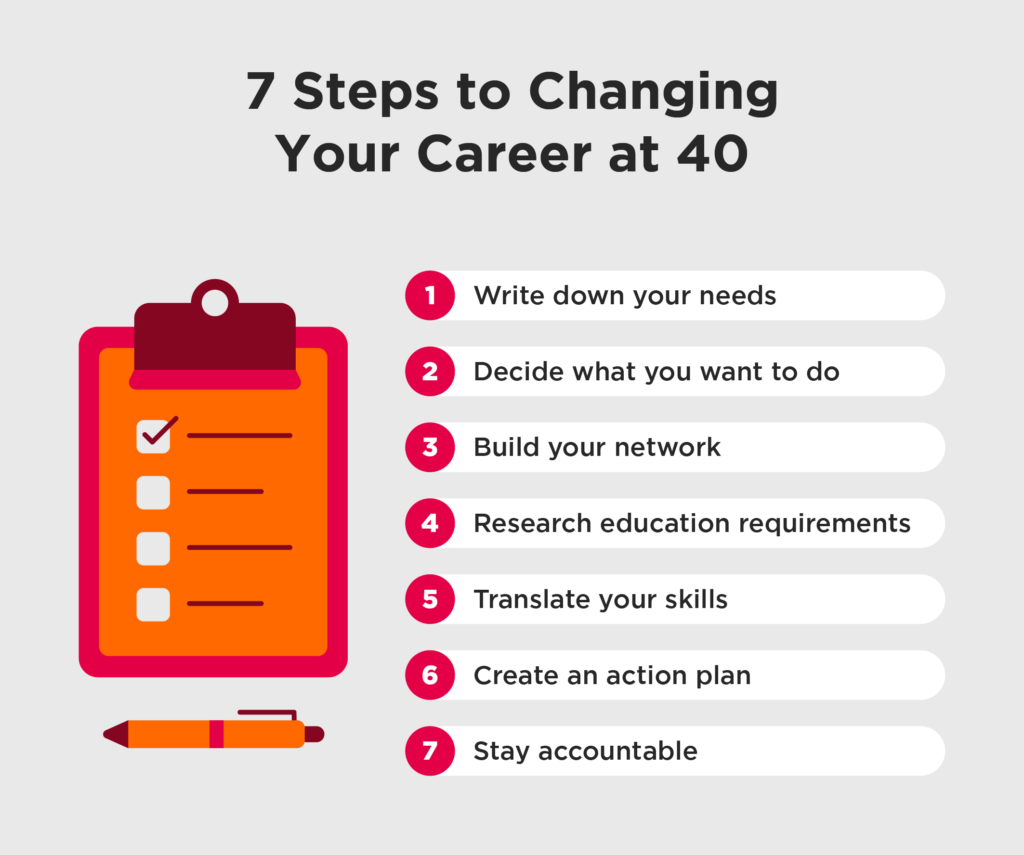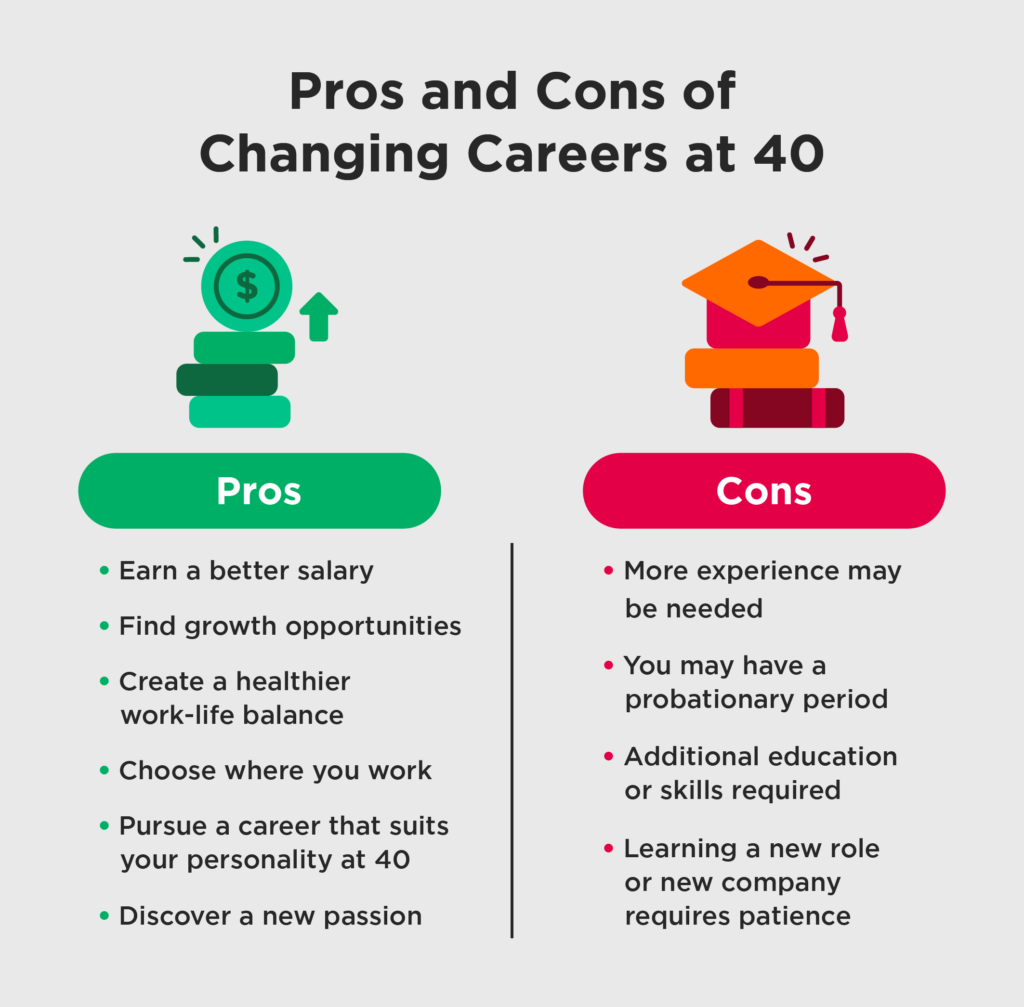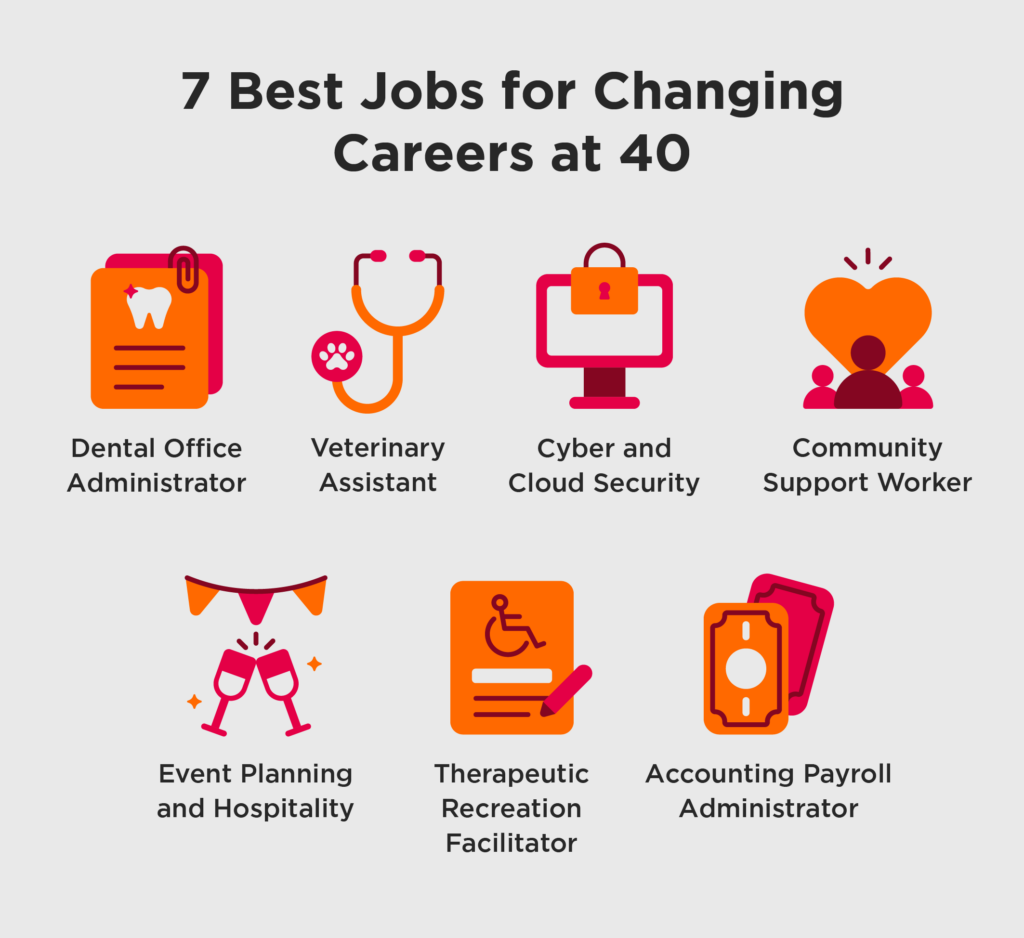How To Make a Career Change at 40 (+7 Best Jobs)

quick answer
You can make a career change at 40. We explain how Canadians can find new careers in hospitality, cybersecurity, social services, and more.
In This Article
Who says you’re too old to change careers?
If you want to make a career change at 40, you aren’t alone — half of Canadian workers want to change careers! People want better salaries, benefits, opportunities, and balance.
So, if your gut tells you to change careers, it’s time to consider your options. You’ve gained education, experience, and wisdom over the years. You’re more ready now than ever.
There’s no reason to hesitate when finding a career that works for you. We’ll explain how to embark on a midlife career change, discuss the pros and cons, and look at some great options.
Write down the reasons why you want to start a new career. This list will be useful for setting goals and staying accountable. Your career goals should align with your personal needs.
Prepare to make lifestyle changes. If one of your goals is to reduce your stressful workload, it may mean taking a smaller salary or relocating. Staying open and realistic about what these changes will mean is important.
The next step in a midlife career change is deciding what you want to do. Note what you like and dislike about your current job. This can help you decide on your future career.
For example, let’s say you work in a corporate accounting office. You might feel tired of sitting in an office and want to help people in a more interactive setting. You can consider working as a Dental Hygienist or searching for a career in community service.
If you’re passionate about working for yourself, join a business program and gain the skills and education to make it happen. You should be able to love what you’re doing at this stage of life — choose a new career based on your passions and interests.
Your network can make a huge difference when starting a new career. Networking events are a great way to meet knowledgeable professionals and make connections. And websites like LinkedIn are a great place to network online.
At Robertson College, we’ve designed many programs for students looking for a new career. We understand the importance of networking and support systems. Our graduates can contact our team for advice anytime — even after graduation.

Depending on the career or industry, you may need more education. You can learn new things by networking and looking up job postings to see what skills and education may be required.
After researching, you can see what programs are available online or in person. And you don’t need years of post-secondary education to make a difference. You can upgrade your existing skill set with a Diploma or Certificate in just a year.
Transferable skills are useful at any job, and identifying these skills has a lot of benefits. First, you can update your resume in a way that will impress potential employers. Second, you will show yourself how skilled you already are.
For example, a role might ask for “advanced communication skills.” To demonstrate how your experience supports this requirement:
Be prepared to speak about your skills in an interview with real examples. Practice with friends or read it out loud. The most important thing is to speak with confidence.
Now, it’s time to turn your ideas into actions! This can be the hardest step for our prospective students –– making the calls, sending the emails, and reaching out to your network.
Action plans can be as simple or as elaborate as you like. Don’t try to be perfect — do your best and remember your goals — the rest will follow.
Speaking with close friends and family can help you feel more confident. Sharing your goals can make you more accountable and motivated to achieve them.
Talk to the people who support and value your career change. Alongside your friends and family, educational institutes can offer support and resources. Speak with our Student Admissions Advisor with any questions or concerns about your career change.
Regarding your future and personal fulfillment, it’s always worth making a change. Is it a little scary? Does it take work? Yes! But that doesn’t mean it’s not worth it. Eighty-seven percent of Canadians who changed careers said they are happier since they made the change.
Changing your career at 40 can lead to:
Beginning a new career does not mean starting from the bottom. You’ve already been to school, received training, and have impressive skills. Your next career should build on these skills and experience. Our Workforce Team helps students communicate their experiences for interviews and networking.
It’s very common for people of all ages and industries to explore different career options. At Robertson, we see students from all walks of life and at various career stages. In 2022, nearly 24% of Canadian workers took on a new role or position.
Being 40 doesn’t mean you’re too old to start a new career. Canadians retire around 65, so your next career could last around 25 years. Upgrading your skills and gaining job experience can help you pivot to a new role or industry.
Career changes are common, and you might be ready for plenty of reasons. Changing careers at 40 does not mean settling for less — it means striving for more.
Fortune favours the bold! So, any significant life change has pros and cons. If you’re serious about changing careers, you should weigh the pros and cons for yourself. Face things head-on, and you’ll be ready to make a change.

People change careers at 40 for many reasons. It might be the influence of an external event, like a lay-off or personal choice. All reasons are valid. Now that you know why people change careers, the big question is how to do it.
You don’t need another four years of schooling to change careers. For those who want to change careers soon, you can earn a Certificate or Diploma in a year or less. Here’s a list of great second careers that don’t require a Degree.
As a Dental Office Administrator, you are the first face patients see when they arrive at their appointment. These professionals play a key role in the daily operations of a dental office. It’s a perfect option for people with interpersonal and organizational skills.
This job usually requires a Dental Office Administrator Diploma or Certificate. It’s a great midlife career change option because it doesn’t require a long education and is a great flexible career later in life.
If you love animals, you should consider working as a Veterinary Assistant. In this role, you get to work with animals and their owners. And Veterinary Assistants can also assist Veterinary Technologists with standard procedures.
Earning a Veterinary Assistant Diploma can open lots of doors. Graduates can work in veterinary hospitals, pet stores, humane shelters, pet daycares, and other animal facilities.
Maybe you need a career that makes a difference for others. As a Therapeutic Recreation Facilitator, you can help improve people’s health and support them.
This rewarding job requires a Therapeutic Recreation Facilitator Diploma or Degree. Our online program prepares students to begin their careers in less than a year.

Do you love helping others? Community Support Workers help deliver many individuals physical, psychological, and social support. This could be in a hospital, a care centre, a shelter, or other environments.
These community-centered jobs usually require a Degree or Diploma. Robertson College’s Community Support Worker Diploma Program is available online.
This career takes a lot of administrative skills, but yes — you will be throwing parties. Event Planning is a key part of weddings, corporate events, and cultural events. It’s a great second career for people who thrive in a fast-paced environment.
You can upgrade your Hospitality skills with our Event Planning and Hospitality Diploma Program. We’ll help you learn the fundamentals for planning, promoting, and managing events in your city.
Technology is constantly growing, and so are career opportunities. This is great news for Cyber and Cloud Security roles. These jobs are a great second career choice because they can be lucrative and have plenty of entry-level opportunities.
In-demand roles may need a Certificate or Diploma. So, we designed our Cyber and Cloud Security Diploma Program with experts to ensure it meets industry standards. And we also provide exam vouchers at no extra cost for important certifications.
Some people change careers for more stability. Payroll Administration jobs are great for this. Wherever people work and get paid, there’s a Payroll team.
Canadian employers prefer candidates with a Payroll Compliance Professional (PCP) Certificate. Our Accounting Payroll Administrator Diploma program is affiliated with The National Payroll Institute. Successful graduates can challenge the PCP exam before entering their second career.
We know you can do this, and we’re here to help. Robertson students and graduates can always rely on our Workforce Team for help with resumes, job hunts, and interviews.
Get started today with these resources:
You can make a career change at 40! It may seem overwhelming at first, but it all becomes easy when you think about the steps. Stick with the process, rely on your network, and keep your goals top of mind. It’s never too late to change your career and do something you love.
Start your path to a new career today with Roberton’s Diploma programs!
In This Article
Once you take the first step, one of our Student Admissions Advisors will get in touch to better understand your goals for the future.
Apply Now